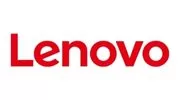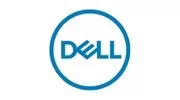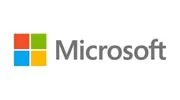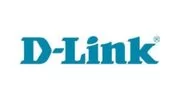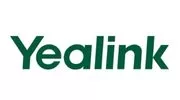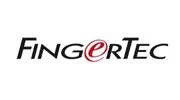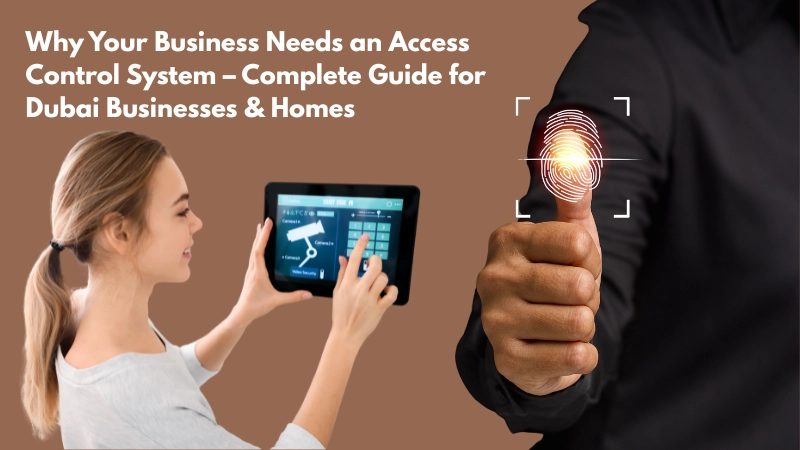Security
Why Your Business Needs an Access Control System – Complete Guide for Dubai Businesses & Homes
In today’s busy business world, keeping things secure is crucial. Whether you own a small shop, a medium-sized office, or a large corporate building in Dubai, having an access control system in place helps ensure that only the right people can get into certain areas. This not only keeps your employees, customers, and valuable assets safe but also makes your daily operations run more smoothly.
Dubai is a center for businesses and shopping, so security is really important. By installing a good door access control system, you can stop unauthorized individuals from entering, cut down on theft, and even boost efficiency by linking it with attendance and monitoring systems. In this guide, we’ll explore everything you need to know about access control systems in Dubai, the different types available, popular brands, and tips on how to choose the best system for your business.
What is an Access Control System?
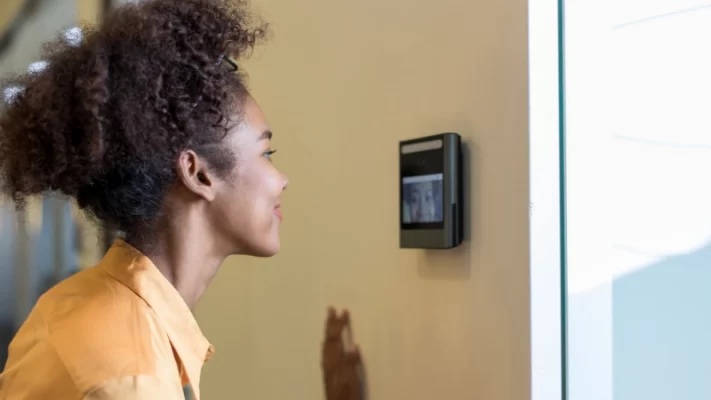
An access control system is a security tool that regulates who can enter buildings, rooms, or sensitive areas. It checks credentials like ID cards, PIN codes, fingerprints, facial recognition, or mobile apps. Only people with proper authorization can get in.
There are different types of access control systems:
- Standalone systems – These are basic keypads or card readers suitable for small offices.
- Networked or IP-based systems – These provide central control for multiple doors or locations.
- Biometric access control systems – Use fingerprints or face recognition for high-security areas. You can read a detailed guide on fingerprint and facial recognition systems here.
- Mobile-based access control – These allow entry using smartphones or NFC devices.
By using an access control system, businesses in Dubai can monitor who enters their premises, log entry times, and even control access remotely if needed.
The Importance of Access Control for Businesses and Homes in Dubai
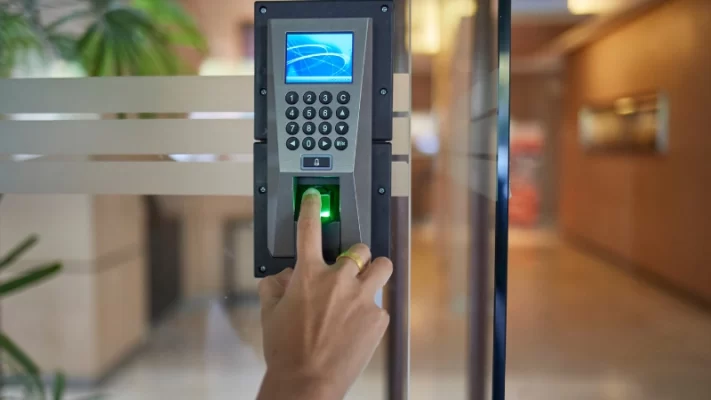
Security threats can impact all properties, not just large corporations. Small businesses, warehouses, and homes also face risks every day. Here are important reasons to invest in an access control system in Dubai:
1. Boost Security for Employees and Assets: Access control restricts entry to sensitive areas like server rooms, warehouses, and executive offices, allowing only authorized personnel.
2. Monitor and Record Access: Modern systems track every entry event. This helps in monitoring movements and reviewing security issues.
3. Easy Integration: Many access control systems work well with current security tools like CCTV, alarms, and attendance tracking, creating a complete security solution.
4. Save Money: While there are initial costs, an access control system can reduce losses from theft and cut down on the need for extra security staff.
5. Follow Compliance Rules: Some regulations in Dubai require controlled access to certain areas within businesses.
For businesses wanting to learn more about the advantages, our article on why your business needs an access control system offers a detailed overview.
Types of Access Control Systems
Choosing the right type depends on your business size, security needs, and budget. Here’s a detailed look at popular options:
Types of Access Control Systems
Selecting the right access control system depends on your business size, security needs, and budget. Here’s a straightforward overview of popular options:
1. Standalone Systems
These are simple door access control systems suitable for small offices or shops. They typically use keypads, PIN codes, or simple RFID cards. Standalone systems are easy to set up and affordable, but they do not allow control over multiple doors.
2. Networked / IP-Based Systems
IP access control systems let you manage several doors from one dashboard. They suit medium and large offices, especially those with multiple floors or locations. These systems can connect with CCTV cameras and alarms, providing better monitoring and control.
3. Biometric Access Control Systems
Biometric systems are gaining popularity in Dubai because of their strong security features. They use fingerprints, facial recognition, or iris scans for access. The cost of a biometric access control system varies by brand, number of doors, and technology used. For more details on leading brands, refer to our article on the top 5 biometric brands in Dubai.
4. Mobile Credential / Smartphone-Based Access
Modern systems allow entry through smartphones using Bluetooth or NFC technology. These options are convenient, touchless, and adaptable for businesses with multiple locations.
5. Hybrid Systems
Some businesses choose to combine different technologies, like biometric and card access, for added security. This approach offers both convenience and high-level protection.
Top Access Control Brands in Dubai
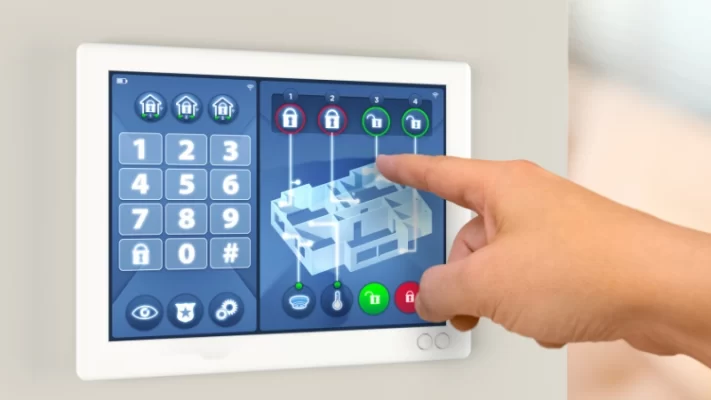
When you invest in an access control system in Dubai, it is important to choose a reliable brand. Here are some popular options:
– ZKTeco: This brand provides affordable and dependable biometric and card-based systems. You can find more information in our article about ZKTeco Access Control Systems in UAE.
– Cisco: Cisco offers advanced networked solutions for large businesses, focusing on integration.
– Other brands to consider: Honeywell, Bosch, Hikvision, and Dahua.
Choosing a reputable brand guarantees durability, support, and necessary software updates. These features are vital for the busy business environment in Dubai.
Key Features to Consider Before Buying an Access Control System
Before you buy an access control system, keep these features in mind:
1. Scalability: Ensure the system can grow as your business adds more doors.
2. Integration: Check if it works well with CCTV, alarms, time-attendance systems, and visitor management tools.
3. Biometric Accuracy: If using fingerprints or facial recognition, select a system with low error rates.
4. Durability: Choose devices that are weatherproof and tamper-resistant for outdoor doors.
5. Ease of Use: Look for user-friendly interfaces for both administrators and staff.
6. Remote Management: Confirm you can control doors from anywhere using mobile or web apps.
7. Cost: Account for the initial purchase price, installation, and ongoing maintenance costs.
A solid access control system boosts security and helps your operations run smoothly. It also provides a good return on your investment.
Access Control Solutions Based on Business Size
Selecting the right access control system is important for your business. The size of your business and your security needs will guide your choice. Here’s a clear overview for businesses in Dubai, including residential setups:
1. Small Shops & Retail Outlets
Small businesses often have one or two entry points. A basic door access control system using RFID cards or PIN codes usually works well. Key features to consider are:
– Simple installation without complicated wiring.
– Ability to connect with CCTV cameras for monitoring entrances.
– Affordable biometric access control system price if you prefer fingerprints.
For instance, a retail shop in Deira can benefit from a ZKTeco access control system with one biometric reader for staff and managers.
2. Medium Offices & Small Businesses
In Dubai, medium-sized offices usually have more than one floor and several ways to enter. For these places, using networked or IP-based systems is a great choice. Here are some important features:
– You can manage many doors from one place.
– It works well with time and attendance systems.
– There are fingerprint readers for very secure areas like server rooms.
– You can control everything from your phone or computer.
If you want to learn more about why businesses should use access control systems, check out our guide on the benefits of IP-based systems.
3.Solutions for Large Businesses and Shopping Centers
Large businesses and shopping centers require robust solutions for access control. Key features include:
– Centralized systems that can be managed from the cloud or on-site, allowing control of hundreds of doors.
– Multi-factor authentication, combining card access with biometric verification.
– Seamless integration with CCTV, alarm systems, visitor management, and HR software.
– Comprehensive logs to ensure compliance and facilitate audits.
A Cisco access control system meets the needs of large organizations that experience high foot traffic and manage multiple locations effectively.
3. Residential Buildings & Villas
In Dubai, residential properties can enhance security with modern mobile access control and biometric systems. These solutions work well for:
– Apartment entrances
– Private villas in gated communities
– Integration with smart home technology and CCTV systems
Touchless entry through smartphones or NFC cards is gaining popularity for its convenience and hygienic benefits.
Installation and Maintenance Guidelines
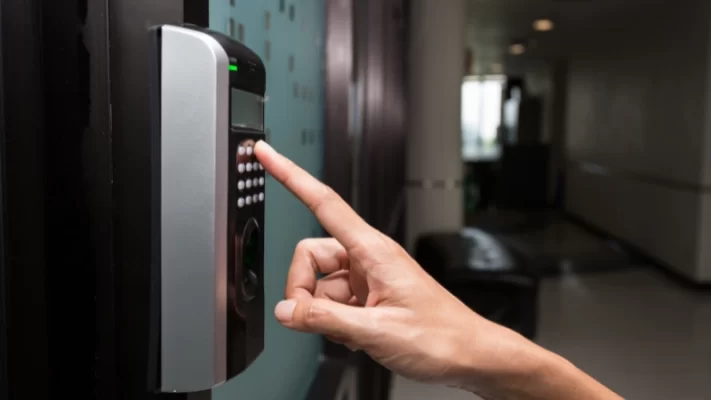
To ensure your access control system operates effectively, proper installation and maintenance are crucial. Here are some straightforward tips for businesses in Dubai:
1. Hire Certified Installers
Choose professionals for installation. They will handle wiring, network setup, and integrate the system with your current security devices. Always ask for references and review their previous work.
2. Design the Layout Wisely
Identify all doors, entry points, and sensitive areas. Determine which type of access readers — biometric, card, keypad, or mobile — are necessary for each location.
3. Set Up Software and Train Users
Configure user profiles, access levels, and schedules in the software. Provide training for staff on how to use the system effectively, including how to add or remove credentials.
4. Conduct Preventive Maintenance
– Regularly test readers, locks, and controllers.
– Check for firmware updates to fix any security issues.
– Replace worn-out access cards or malfunctioning biometric readers immediately.
By following these guidelines, you can help ensure your access control system remains reliable and secure.
5. Monitor & Audit
Use system logs to monitor entries and exits. Detect unusual patterns early to prevent security breaches.
Cost Considerations in Dubai
When you invest in an access control system, it’s important to consider more than just the hardware. Several factors affect pricing in Dubai:
1. Number of Doors and Users: More doors and users require additional hardware, which increases setup costs.
2. Type of Access Control: Biometric systems typically cost more than standalone card readers, but they provide enhanced security.
3. Brand Selection: Choosing reputable brands like ZKTeco or Cisco may involve higher initial costs, but they can reduce maintenance and upgrade expenses over time.
4. Integration Requirements: Connecting your system to CCTV, alarms, or HR software adds complexity and can raise the overall price.
5. Installation and Maintenance: Professional installation promotes durability and ensures the system operates smoothly.
Recommendation: Compare prices for biometric access control systems across different brands. Also, evaluate long-term benefits such as reduced theft and increased efficiency.
Frequently Asked Questions (FAQs)
1. What is a Physical Access Control System?
A Physical Access Control System (PACS) secures and regulates entry to buildings, rooms, or specific areas. It ensures that only authorized individuals can access designated locations. Methods include key cards, PIN codes, biometric scans like fingerprints or facial recognition, and mobile credentials. Implementing physical access control is crucial for businesses and residential complexes in Dubai to safeguard employees, customers, and valuable assets.
2. ow does an Access Control System function?
An access control system verifies the credentials of individuals attempting to enter secure areas. When someone presents an authorized credential — such as a card, PIN, fingerprint, or mobile app — the system checks it against a database. If the credential is valid, the door unlocks. Modern systems also log entries and exits, integrate with CCTV, and allow for remote management. This setup enhances security and operational efficiency for businesses in Dubai.
3. How do you install an Access Control System?
To install an access control system, follow these steps:
1. Plan the layout: Identify which doors and areas require protection and choose the access method (card, biometric, mobile, etc.).
2. Choose hardware: Select appropriate readers, controllers, locks, and accessories for your environment.
3. Professional installation: Certified technicians will handle wiring, network configuration, and device mounting.
4. Software configuration: Set up user profiles, access levels, schedules, and remote management tools.
5. Testing & training: Test all doors to ensure proper functionality, verify logs are accurate, and train staff on system usage.
Following these steps guarantees a reliable access control system for offices and residential buildings in Dubai.
4. What is anti-pass back in an Access Control System?
Anti-pass back is a security feature that prevents the same access credential from being used to enter an area multiple times without first exiting. For example, in a Dubai office, if an employee uses their access card to enter, they cannot give it to someone else for re-entry without leaving first. This feature helps maintain accurate access logs, prevents unauthorized entry, and improves overall security in busy locations such as corporate offices, malls, or gated communities.
